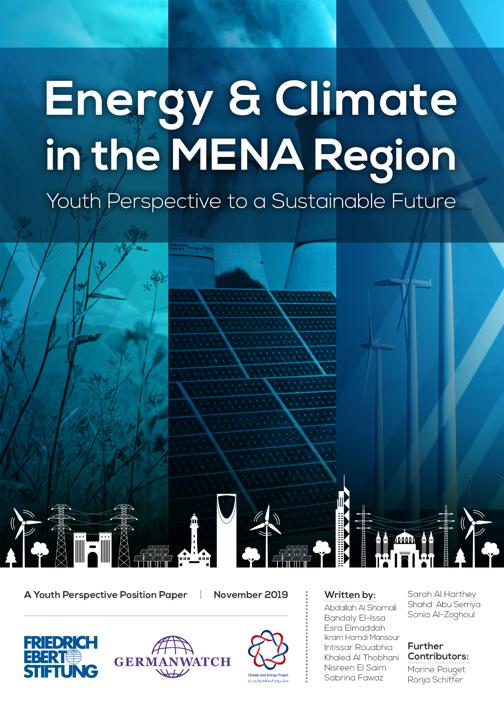Publikationen der StiftungEnergy & climate in the MENA region Titel
Titelaufnahme
- TitelEnergy & climate in the MENA region : youth perspective to a sustainable future ; a youth perspective position paper
- Verfasser
- Körperschaft
- Erschienen
- Parallele Sprachausgabe
- Umfang1 Online-Ressource (32 Seiten) : Illustrationen, Diagramme, Karten
- SpracheEnglisch
- DokumenttypDruckschrift
- Schlagwörter (LOCAL)
- Schlagwörter
- Geografika
- ISBN978-9923-759-02-8
- URN
- Das Dokument ist frei verfügbar
- Nachweis
- Archiv
Rising sea levels and more frequent dangerous weather events are among the immediate impacts of climate change already felt across the world. Sadly, these will only become more severe as global average temperature rises. The Middle East/North Africa (MENA) region is the area of the world where climate impacts are most severe. Limiting global warming and reducing greenhouse gas (GHG) emissions, a priority for the majority of states worldwide, requires that almost all facets of our daily life must be restructured: water, food, buildings, transportation, global trade, etc. The energy sector is the largest source of global GHG emissions, which cause temperatures to rise and climate change to worsen. In these circumstances, renewable energy (RE) is emerging as an alternative to traditional fossil fuels, with these sorts of technologies rapidly improving and becoming more affordable. Thus, the promotion of RE and energy efficiency (EE) is a crucial aspect of the international climate debate and many countries� national energy policies. The MENA region is blessed with the huge natural potential for solar and wind energy. Furthermore, this region has another important resource: a young population. To achieve a successful, fair, and complete energy transition, countries need agents of change. These agents should be innovative, globally minded, and motivated to work for the future of their country, world, and themselves. Who else but the youth could better assume the mantle of these champions for transformation? Moreover, a project gathering people from the entire region could enhance energy cooperation and dialogue between MENA countries. Through a joint effort, the Friedrich-Ebert-Stiftung (FES) and Germanwatch decided to encourage and empower young people from the MENA region to engage in climate and energy policy issues. Thanks to several training programs, young participants from 10 countries (Morocco, Algeria, Tunisia, Egypt, Sudan, Lebanon, Palestine, Jordan, Saudi Arabia and Yemen) were able to learn about energy issues and develop a common policy paper on their visions for their region�s energy future. This paper is not only an opportunity for its young authors to present their views, but also a chance for decision makers to learn first hand about the energy future their young citizens envision for the region. We would like to sincerely thank our colleagues from the FES Jordan and Egypt offices, as well as everyone who contributed to the project. A very special thanks goes to the young authors and their fantastic work. We hope they will continue in their engagement with this issue, and that it will lay the foundations for a clean energy future for the region
